香港朗文4a各单元总结
4A朗文Chapter4和5知识点梳理

4A朗文Chapter4 和5知识点梳理【必讲知识点】1. 辨析 few , afew , little , alittle :few极少,几乎没有表示“否定”意义接可数名词复数形式afew少许表示“肯定”意义接可数名词复数形式little极少,几乎没有表示“否定”意义接不可数名词alittle少许表示“肯定”意义接不可数名称2. fewer与less都可以表示“更少”(1) fewer后接可数名词的复数形式,是few的比较级(2) less后接不可数名词,是little的比较级3. 辨析 much , manP, somuch 与 somanPsomuch如此多接不可数名词somanP如此多接可数名词的复数形式much许多接不可数名词manP许多接可数名词的复数形式4. alotof=lotsof 表示许多,后可接可数名词的复数形式以及不可数名词5. stop 用法stoptodo 停止去做另外一件事stopdo ing 停止做某事(指手头的事)6. Therebe句型的一般过去时1 .肯定式therebe句型的一般过去时表示过去某地或某时存在某人或某物,其一般过去时态的陈述句由“thewas /were +主语+地点状语+时间状语”构成。
therewas后接单数名词;therewere 后接复数名词。
例如:Therewasacar un derthetreeamome ntago. 冈H才这棵树下有一辆小轿车。
Thereweretwoforeig nteachers ino urschoollastPear. 去年我们学校有两名外教。
2 .否定式therebe句型一般过去时的否定式是在动词 was或were的后面加not,可缩写为wasn 't或 weren ' t。
例如:Therewasn ' tafilminthecinemalast night.昨晚电影院里没有演电影。
香港朗文英语4a语法-综合复习汇总

朗文4A综合复习汇总综合复习一(名词)一.用a/an填空________fish __________hat__________ umbrella _________zebra__________ egg _________igloo__________octopus _________apple二.看图,数数,写词组Example:two dishes三.阅读理解Kitty was a little cat. He was short. Gigi was a giraffe. He was tall. One day they played in the garden. In the garden there were many fruit trees. Kitty looked at the applesin the tree “Do you want to eat the apples in the tree, Kitty?”asked Gigi.“Yes, but I’m short. I can’t pick them,”answered Kitty.“Let me help you. I’m much taller than you,”said Gigi.“OK,”said Kitty.Then Gigi picked the apples in the trees and threw to Kitty. And Kitty put the applesinto the basket.“Don’t pick too many apples. Now the basket is full,”said Kitty. “Shall we eat them now?”“No, Kitty. The apples are dirty. Go and wash them first,”said Gigi.( ) 1. Kitty and Gigi were in the garden.( ) 2. Kitty wanted to have the pears in the trees.( ) 3. Gigi was tall, he could pick the apples.( ) 4. Kitty carried the apples to his home.( ) 5. They ate the apples before they wash them.四.读绘本的心得,不少于10句话五.完型填空Today we have 1 new students in 2 school. 3 are Chinese. 4 names are LiuMei and Liu Fang. 5 twins. They 6 the same. 7 in Class One, Grade One. 8 is Liu Mei? 9 is Liu Fang? Oh, they are over 10 .( )1.A. one B. two C. three D. four( )2.A. my B. your C. our D. we( )3.A. they B. we C. They D. We( )4.A.They B. My C. His D. Their( )5.A. They’re B. He’s C. We D. Their( )6.A. see B. look C. is D. are( )7.A. We B. Its C. They’re D. These( )8.A. She B. That C. He D. Who( )9.A.Who B. He C. She D. That( )10.A. here B. at C. there D. in家庭作业部分一.阅读理解The Smiths like to go out for a trip on Sundays. This Sunday they want to go to theWest Hill. Jack and Mike, the sons, get up very early in the morning. Jack puts on a shirtand jeans, and Mike puts on a T-shirt and jeans. They also put on their running shoes.After they help their mother do the housework around the house, they put bread, meat,eggs and some fruit in a basket and carry it to the car. Mrs Smith also takes four tins ofcoke with her. The little dog is running after her. It wants to go with them, too. They are allvery happy.( ) 1. On Sundays the Smiths like _____.A. to stay at homeB. to watch TVC. to go out for a tripD. to do shopping ( ) 2. Jack and Mike wear ____.A.jeans and running shoesB. coats and trousersC. jackets and jeansD. jackets and coats( ) 3. They take with them ___.A. some apples and orangesB. some bananas and pearsC. some meat and breadD. some food and books( ) 4. They can have ___________ each.A. two tins of cokeB. a tin of cokeC. four tins of cokeD. three tins of coke( ) 5. What’s the best title for the passage?A. The SmithsB. The West HillC. ClothesD. A Trip二.用适当的形式填空1.apple2. icecream3.banana4. hour5.horse6. two (watch)7.three (dish) 8. four (potato) 9. four (fox) 10. ten (knife) 11. five (leaf) 12.six (deer) 13. (this)are some trees and (that)are some apple trees.综合复习二(用所给词的适当形式填空)1.The giraffe _____________(tall) the horse.2.The camel ____________(short) than the giraffe.3.The bee ____________(tiny) the cockroach.4.The hippo ________________(heavy) the panda.5.The eagle ______________(big) the peacock.6.The mouse _______________(small) the rat.7.The blue whale ________________(large) animal in the sea.8.The hummingbird _________________ (tiny) bird.9.Dolly _____________(tall) girl in her class.10.The wolf ______________(scary) animal in the dog family.11.The shark has ___________(big) teeth in the sea.12.The rabbit has __________(long) ears _________the cat.13.Tina is __________(noisy) than her brother.14.The peacock has ___________(pretty) feathers than the parrot.15.The elephant has ______________(long) nose in the world.16.The crocodile has _____________(big) mouth than the snake.17. My little brother has ______________ eyes in my family.18.Fred has ___________(strong) arms than Ken.二.写出下列形容词或者副词的最高级Big- Small-Tall- Short-Heavy- Light-Strong Pretty-Good- Many-Long- Scary-Noisy- Hairy-Tiny- Interesting-Dangerous- Exciting-Beautiful- High-Wide- Colourful-三.写出下列动词的过去式Do- Wear- Walk- Travel- Ride- Pay- Live- Am/is- Feel- Fall- Find- Start- Stop- Look- Say- Take- Miss- Ask- Write- Have- Send- Explain- Wake- Are- Fly- Play- Make- Like- Draw- Put- Have- Flick- Want- Hit- Keep- Go- Lose- Stay- Happen- Spill- Can- Will- Think- Talk- Come-Eat- Show- Call- Enjoy- Reply- Walk- Come- Speak- Catch- Shout- Swim- Break- Save- See- Meet-四.阅读理解One day Mr. and Mrs. White go shopping by car. They stop their car near a store.They buy a lot of things and they want to put the things in the car. But Mr. White can’topen the door of the car, so they ask a policeman to help them. The policeman is veryfriendly to help them. Just then a man comes up and shouts: “What are you doing with mycar?”Mr. and Mrs. White take a look at the car’s number and they are frozen there. It isn’t their car.( ) 1. Mr. and Mrs. White drive for ___________.A.fishingB. shoppingC. Business( ) 2. They stop their car _________.A. at the parking spotB. near the seaC. near the store( ) 3. They want to put the things _______.A. in a big bagB. in their carC. in other’s car( ) 4. Mr. White can’t open the car, so __________.A.they walk homeB. they ask a policeman to helpC. they call a taxiMr Brown lives in a nice house in a small town with his wife(妻子) , Mrs Brown. From Monday to Friday he works in an office near his house. He is free on Saturdays andSundays. He has a nice garden beside his house. He likes growing flowers and he oftenworks in the garden on Saturdays and Sundays. The flowers are very beautiful and Mrs Brown likes them very much. She often helps Mr Brown.( )1. Mr Brown lives in _________with his wife.A.a cityB. a small townC. a big town( )2. He works_________ days a week in his office.A.fourB. fiveC. six( )3. He isn’t _________on Saturdays and Sundays.A.freeB. busyC. happy( )4. He likes _________ on Saturdays and Sundays.A.working in his gardenB. walking in his gardonC. looking at his garden( )5. Mrs Brown _________ the flowers. A. like B. doesn’t like C. often helps There is a new park near my house. day today. My family and I are in the park now. On my left, there is a cafe. On my right, there is a big lake. There are many fiowers andtrees near the lake. There’s a small hill behind the lake. Near the lake, there is a sign. It says,“Don’tswim in the lake!”There is a playground in the middle of the park. There are some small shops near the gate. The park is so beautiful. We like it very much.( )1. The park near my house is _____.A.new and beautifulB. old and beautifulC. clean and newD. old and clean( )2. Is there a cafe in the park? ______A.Yes, there isn’t.B. No, there isn’t.C. Yes, there is.D.No, there is.( )3. Peopie can’t _______in the lake.A.swimB. fishC. boatD.play( )4. The shops in the park are4 not _______A.smallB. bigC. goodD.pretty( )5. -Do we like the park? -________A.Yes, we do.B.No,we do.C.Yes, you do.D. No,we don’t.综合复习3(第三人称单数以及其他时态)一.写出下列动词的第三人称单数。
香港朗文4a各单元总结汇编

4a各单元总结Unit One1.重点语法和单词:2.重点句型:(1) –What do you like doing?-- I like swimming, reading and listening to music(2) I like reading too.(3) I don’t like playing table tennis either.(4) Let’s go ice-skating.3.重点词组:4.动词的过去式Unit two1.重点语法和单词:2.重点句型:(1)--Do you ever tidy your room?-- Yes, I usually tidy my room.(2)—Does she ever play the violin?-- No, she never plays the violin.-- No, she doesn’t play the violin.3.重点词组:4.动词的过去式Unit Three1.重点语法:2.重点单词和词组:3.重点句型:(1)--Was there any cola when you were young?-Yes, there was.(2)The game I like best was marbles.(3)How do you play marbles?(4)– Did you wear trainers fifty years ago?--Yes, I did.(5)—Did you have a telephone?-- No, I didn’t. Rich people had telephones at home but poor people didn’t. (6 ) – Did you shop at the supermarket?--- No, I didn’t. There weren’t any supermarkets.(7) – Did you go to school?-- No, I didn’t. Rich children go to school but poor children didn’t.(8) –Did you listen to the radio?-- Yes, I did.Where(哪里)do you like going to in your holiday?How(如何)do you help at home?How much (多少钱,提问不可数名词)is it? --- It is five dollars. How many (多少,提问可数名词)books in your home?What time(什么时间)is it?What(什么)are you doing now? ----I am doing my homework. What(什么)is the weather like today? ----It’s windy.What color (什么颜色)is it? ---- It is red.What (什么)are you? ( What do you do?) -----I am a driver.When(什么时候)is your birthday? ---on 2nd MayHow old(多大)are you? ----I am ten.Who (谁) are you? -----I am David.Which(哪一个) club do you want to join?Why(为什么)do you like playing football?----Because I like being healthy.。
香港朗文4A词汇及练习
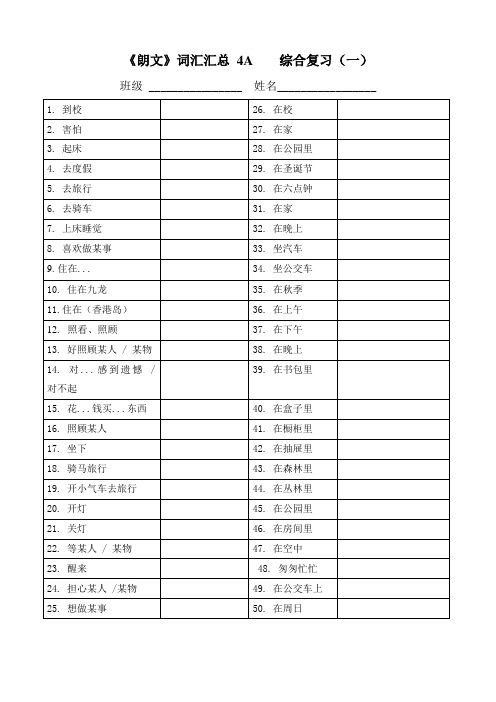
go to bed early
eat out
52. 在地板上
on the floor
71. 起床晚了
get up late
53. 在架子上
on the shelf
72. 上网
surf the Net
54. 在沙发上
on the sofa
73. 快餐
Fast food
55. 在农场上
on the farm
74. 口香糖
chewing gum
in the sky
23. 醒来
wake up
48. 匆匆忙忙
in a hurry
24. 担心某人 /某物
worry about sb / sth
49. 在公交车上
on a bus
25. 想做某事
want to do sth
50. 在周日
on Sunday
51. 在床上
on the bed
70. 外出吃饭
live in
34. 坐公交车
by bus / take a bus
10. 住在九龙
live in Kowloon
35. 在秋季
in autumn
11.住在(香港岛)
live in Hong Kong Island
36. 在上午
in the morning
13.照看、照顾
look after
37. 在下午
《朗文》词汇汇总4A综合复习(一)
班级 ________________ 姓名_________________
1. 到校
26. 在校
2. 害怕
27. 在家
(完整版)香港朗文4a各单元总结
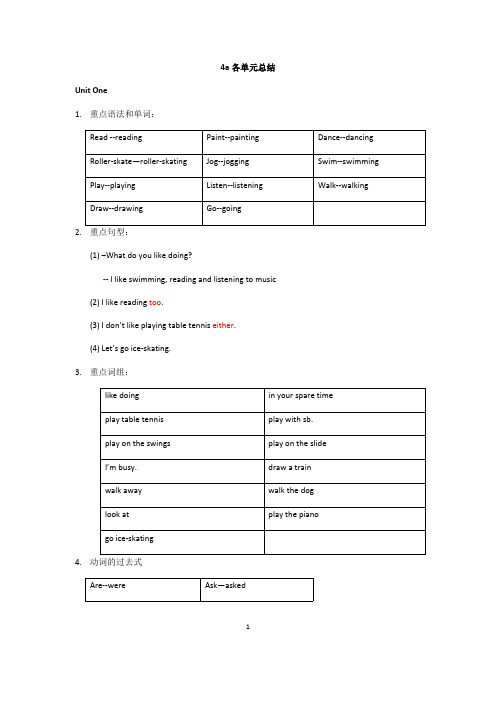
4a各单元总结Unit One1.重点语法和单词:Read --reading Paint--painting Dance--dancing Roller-skate—roller-skating Jog--jogging Swim--swimming Play--playing Listen--listening Walk--walking Draw--drawing Go--going2.重点句型:(1) –What do you like doing?-- I like swimming, reading and listening to music(2) I like reading too.(3) I don’t like playing table tennis either.(4) Let’s go ice-skating.3.重点词组:like doing in your spare timeplay table tennis play with sb.play on the swings play on the slideI’m busy.draw a trainwalk away walk the doglook at play the pianogo ice-skating4.动词的过去式Are--were Ask—asked1Say—said Reply—repliedGet—got Walk--walkedLeave--leftGo—wentThink--thoughtUnit two1.重点语法和单词:Always Usually OftenSometimes Never2.重点句型:(1)--Do you ever tidy your room?-- Yes, I usually tidy my room.(2)—Does she ever play the violin?-- No, she never plays the violin.-- No, she doesn’t play the violin.3.重点词组:look after your pets go to bed earlytidy your room eat outget up late surf the Netget angry talk to sb.take photos invite sb. to one’s home am/is/are good at something show one around2look around go into the dining roomenjoy the meal play a lot of musicplay the recorder play the pianoplay the violin play a lot of sportplay pingpong play table tennisplay football watch football matches4.动词的过去式say—said talk—talkedcan—could ask--askedthink—thought show--showedhave—had call—calledwill--would enjoy--enjoyedspill—spilled/spilttake--tookgo--wentUnit Three1.重点语法:am/is/are--was are--were ask--asked like--likedfly--flew make--made flick--flicked want--wanted catch--caught draw—drew stay--stayed happen--happened put--put say--said Play--playedhave/has--had hit--hit3keep--kept go--wentlose--lost do--didwin--won2.重点单词和词组:cola fast food CDscomics clocks air-consmobile-phones rickshaw an oil lampclogs camera fanstove play computer games fly kitesplay hopscotch make nets catch butterflies play marbles draw a circle on the groundgo out of the circle want to +动词原形flick the shooter into thecirclego out a lot of credit cardswear trainers have telephones check your answer ask someone3.重点句型:(1)--Was there any cola when you were young?-Yes, there was.(2) The game I like best was marbles.(3) How do you play marbles?(4)– Did you wear trainers fifty years ago?--Yes, I did.(5)—Did you have a telephone?4-- No, I didn’t. Rich people had telephones at home but poor people didn’t. (6 ) – Did you shop at the supermarket?--- No, I didn’t. There weren’t any supermarkets.(7) – Did you go to school?-- No, I didn’t. Rich children go to school but poor children didn’t.(8) –Did you listen to the radio?-- Yes, I did.Where(哪里)do you like going to in your holiday?How(如何)do you help at home?How much (多少钱,提问不可数名词)is it? --- It is five dollars. How many (多少,提问可数名词)books in your home?What time(什么时间)is it?What(什么)are you doing now? ----I am doing my homework. What(什么)is the weather like today? ----It’s windy.What color (什么颜色)is it? ---- It is red.What (什么)are you? ( What do you do?) -----I am a driver.When(什么时候)is your birthday? ---on 2nd MayHow old(多大)are you? ----I am ten.Who (谁) are you? -----I am David.Which(哪一个) club do you want to join?5Why(为什么)do you like playing football?----Because I like being healthy.6。
香港朗文WTE 4A Chapter1 词汇 语法 知识点

4A Chapter1 背诵内容一.单词部分n.名词v.动词vt. 及物动词vi.不及动词pron. 代词prep. 介词adj. 形容词adv. 副词conj. 连词num. 数词art. 冠词interj.感叹词Part I.1.activity [ækˈtɪvətɪ] n. 活动2.spare [speə] adj. 空余的,空闲的3.roller-skate ['rəʊləˌskeɪt] vi./n. 滚轴溜冰; 滚轴溜冰鞋4.jog [dʒɒg] vi. 慢跑5.too [tu:] adv. 太;也6.either [ˈaɪðə] adv./pron. 也(否定句);(两者中)任何一个7.reply [rɪˈplaɪ] vt./vi. 回答Part II. Past form(过去式)walk—walked ask—asked reply—replied say—said draw-drew be—was/were think—thought go—went get—gotPart III. Gerund (动名词)swim—swimming jog—jogging roller-skate—roller-skating dance—dancing paint—painting listen—listening二.词组部分1.in one’s spare time在某人的空余时间2.listen to (the) music 听音乐3.play chess 下棋4.like/love/enjoy doing 喜欢干某事5.go swimming (去)游泳6.go jogging (去)慢跑7.go roller-skating (去)溜冰8.make a new friend named Tom 交了一个叫汤姆的朋友9.in fact=as a matter of fact= actually 事实上10.i n the gym 在体育馆11.i n the fitness club 在健身俱乐部12.i ndoor stadium 室内体育馆13.d ance flamingo 跳弗莱明哥14.p erform ballet 跳芭蕾15.f inish doing 完成某事/干某事16.p ractise sth./doing 练习某事/干某事17.b e good at sth./doing 擅长于某事/干某事18.b e poor at sth./doing 不擅长于某事/干某事19.b e interested in sth./doing 对干某事/干某事感兴趣20.b e afraid of sth./doing 害怕某事/干某事21.a detective story called Conan 一个叫作《科南》的侦探故事22.o ne of the most famous artists 著名的画家之一(一位著名的画家)23.a t the weekend/at weekends/on the weekend 在周末24.a middle-aged woman 一位中年妇女25.o n weekdays 在工作日,平日26.b e busy with sth. 忙于某事27.b e busy doing 忙于干某事28.b e important to sb. 对某人而言是重要的29.e njoy the fresh air and the beautiful moments 享受新鲜的空气与美妙的时光30.e njoy oneself= have a good time 某人玩得很开心31.a family helper 一位家庭帮手32.s end and pick up kids 接送小孩33.p lay the piano/violin 弹钢琴,拉小提琴(西洋乐器名词前加the )34.p lay Erhu 拉二胡(民族乐器前无the)35.p lay table tennis 打羽毛球(球类名词前无the)36.p lay on the swings/slide 在秋千(滑滑梯)上玩37.p lay with sb. 与某人一起玩38.p lay with sth. 玩耍某物39.a bit later 一会儿以后40.w alk away sadly 难过地走开了41.w alk the dog 溜狗42.w alk home=go home on foot 走回家43.g o home =go back home 回家44.g et home=arrive home 到家45.a fter that 在那以后46.t he black notes (钢琴上)黑键47.s ee sb. doing 看到某人在干某事(强调片断)三.句子部分Part I.1.What do you like doing? 你喜欢干什么?2.I like doing…,too/as well. 我也喜欢做某事。
最新香港朗文4A各单元知识要点词汇语法

最新香港朗文4A各单元知识要点词汇语法以下是最新版香港朗文4A各单元的词汇和语法要点:Unit 1: Going Places- 词汇:transportation(交通工具),destination(目的地),navigate(导航),explore(探索)- 语法:一般现在时,there is / there are句型,情态动词can的用法Unit 2: Nature's Forces- 词汇:natural disasters(自然灾害),flood(洪水),earthquake(地震),hurricane(飓风),volcano(火山)- 语法:一般过去时,情态动词must / mustn't的用法Unit 3: Materials and Properties- 词汇:materials(材料),properties(特性),solid(固体),liquid(液体),gas(气体)- 语法:现在进行时,情态动词should / shouldn't的用法Unit 4: Diverse Cultures- 词汇:diverse(多样化的),culture(文化),tradition(传统),custom(风俗),celebration(庆祝活动)- 语法:现在完成时,情态动词could / couldn't的用法Unit 5: The Arts- 词汇:artistic(艺术的),creative(创造性的),performance(表演),sculpture(雕塑),painting(绘画)-语法:一般将来时- 语法:过去进行时,情态动词may / must的用法以上是最新香港朗文4A各单元的词汇和语法要点。
请注意,这些要点可能会因版本差异而有所变化,建议参考最新教材或教师的指导。
香港朗文4A单词及句子

4A Chapter 5 Animals big and small一、四会单词horse camel giraffe owl peacock wolf penguin 马骆驼长颈鹿猫头鹰孔雀狼企鹅eagle hippo turtle rat mouse(mice)crocodile parrot 鹰河马龟老鼠(较大)鼠鳄鱼鹦鹉二、三会单词shark dolphin starfish dragonfly cockroach鲨鱼海豚海星蜻蜓蟑螂insect ant crane golden-fish eel crab昆虫蚂蚁鹤金鱼鳗鱼螃蟹三、comparatives and superlatives of Adjectives: 形容词比较级和最高级1.规则变化:2.不规则变化:四、四会句子(Sentences)The rat is smaller than the rabbit.田鼠比兔子小。
The mouse is the smallest.老鼠最小。
The camel has a longer neck than the horse.骆驼的颈比马长。
The giraffe has the longest neck.长颈鹿的颈最长。
The penguin has pretty feathers.企鹅有漂亮的羽毛。
The parrot has prettier feathers than the penguin.鹦鹉比企鹅有更漂亮的羽毛。
The peacock has the prettiest feathers.孔雀有最漂亮的羽毛。
五、Verbs:(单词过去式)meet-met speak-spoke come-came swim-swam遇见讲话到来游泳break-broke save-saved choose-chose catch-caught打破解救选择抓住become-became成为毛。
香港朗文4A单词及句子

catch-caught 抓住
become-became 成为
毛。
长颈鹿的颈最长。
The penguin has pretty feathers.
企鹅有漂亮的羽毛。
The parrot has prettier feathers than the penguin.
鹦鹉比企鹅有更漂亮的羽毛。
The peacock has the prettiest feathers.
四、四会句子( Sentences ) The rat is smaller than the rabbit.
田鼠比兔子小。
The mouse is the smallest.
老鼠最小。
The camel has a longer neck than the horse. 骆 驼的颈比马长。
The giraffe has the longest neck.
孔雀有最漂亮的羽毛。
五、 Verbs :(单词过去式)
规律: i-a
去掉一个字母:
swim
swam meet
met
sing
sang feed
fed
ring
rang shoot
shot
ought 结尾: 保持不变:
bring brought cut
cut
buy
bought put
put
fight
fought hurt
(健康的) well-better-best
(有病的) ill-worse-worst
(老的) old-older-oldest
(年长的) old-elder-eldest
(远的) far-farther-farthest
最新香港朗文英语4A第四单元知识要点 词汇语法

4A Chapter 4 背诵内容I. 音标和单词:1.hundred ['hʌndrəd] num. 一百thousand ['θaʊznd] num. 一千2.cotton ['kɒtn] n. 棉;棉布;棉织物3.silk [sɪlk] n. 丝绸;(蚕)丝;丝织物;(用于缝纫的)丝线4.horse [hɔːs] n. 马5.sedan chair [sɪ'dæn tʃeə] n. 轿子6.silver ['sɪlvə] n. 银;银色;白银,银子7.coin[kɔɪn] n. 硬币; 金属货币;8.gold [ɡəʊld]n. 金,金色,金黄色;黄金9.paper money ['peɪpə 'mʌnɪ] n. 纸币;票子;钱票10.village ['vɪlɪdʒ] n. 村庄;乡村11.town [t aʊn] n. 小镇;城镇12.content(s) ['kɒntent] n. 目录13.tunnel ['tʌnl] n. 地下通道;地道;隧道14.bridge [brɪdʒ] n. 桥;桥梁15.airport ['eəpɔːt] n. 机场16.fridge [frɪdʒ] n. 冰箱17.pigeon ['pɪdʒɪn] n. 鸽子附:Chapter 4动词过去式变化表(详见朗文P62-65总表)do-did go-went wear-wore find-foundtravel-travelled/traveled pay-paid live-livedam/is-was are-were feel-felt try-tried fall-fellwake-woke keep-kept start-startedstop-stopped look-looked say-said take-tookask-asked write-wrote can-could have-had explain-explained miss-missed give-gave want-wanted cook-cooked eat-ate drink-drank buy-bought celebrate-celebrated make-made listen-listenedII. 词组:1.five hundred years ago 五百年前ten thousand years ago 一万年前2.do a history project 做一个历史课题do a history project on life 500 years ago 做一个关于500年生活的的历史课题3.cotton clothes 棉布衣服4.silk clothes 丝绸服装5.find out 查出,发现6.ride a horse/ride horse s骑马7.travel by sedan chair 乘轿子出行8.travel by boat 乘船出行9.most people 大多数人common people 普通人,平民some people 一些人rich people 富人,有钱人10.in villages 在村庄in towns 在城镇11.pay for things 付款(购物)12.contents page 目录页13.free time 空闲时间14.make money 赚钱15.work hard 努力工作;努力学习16.cook with gas 用煤气做饭cook with firewood 用柴火做饭17.eat congee and vegetables 吃粥和蔬菜eat rice and meat 吃米饭和肉18.live in flats 住在公寓里live in simple/large houses 住在简易的房子/大房子里19.celebrate Christmas 过圣诞节celebrate Chinese New Year 过春节20.buy food at supermarkets 在超市买食品buy food at markets 在集市买食品21.life in the past 过去的生活22.dream about … 梦见……23.do one’s homework 做作业24.feel sleepy 感到困倦,发困,昏昏欲睡25.try to do sth. 尽力做某事try one’s best = do one’s best 竭尽全力26.after a while 过了一会儿27.wake up 醒来28.fall asleep 睡着asleep adj. 睡着的(反义词:awake adj. 醒着的)29.keep in touch with sb. 与某人保持联系30.be away from home 离家在外31.start to do sth. 开始做某事32.look out 往外望Look out! 当心!小心!33.ride in a sedan chair 坐轿子34.miss his own family 想家35.send letters 寄信36.by land 陆运by sea 海运by air 空运37.at the door 在门口III. 句型:1.How did they keep in touch with their families when they were awayfrom home? 离家在外的人们是怎么与他们的家人保持联系的?2.Please may I use your phone? 我能借用一下你的电话吗?I want to call my father. 我想要打电话给我爸爸。
4A朗文Chapter 4和5知识点梳理

4A朗文Chapter 4与5知识点梳理【必讲知识点】1、辨析 few,a few, little, a little:few 极少,几乎没有表示“否定”意义接可数名词复数形式a few 少许表示“肯定”意义接可数名词复数形式little 极少,几乎没有表示“否定”意义接不可数名词a little 少许表示“肯定”意义接不可数名称2、 fewer与 less都可以表示“更少”(1) fewer 后接可数名词得复数形式,就是 few得比较级(2) less 后接不可数名词,就是 little得比较级3、辨析 much,many, so much与 so manyso much 如此多接不可数名词so many 如此多接可数名词得复数形式much 许多接不可数名词many 许多接可数名词得复数形式4、 a lot of = lots of 表示许多,后可接可数名词得复数形式以及不可数名词。
5、 stop 用法stop to do 停止去做另外一件事stop doing 停止做某事(指手头得事)6、There be句型得一般过去时1.肯定式there be句型得一般过去时表示过去某地或某时存在某人或某物,其一般过去时态得陈述句由“there+was/were+主语+地点状语+时间状语”构成。
there was后接单数名词;there were后接复数名词。
例如:There was a car under the tree a moment ago、刚才这棵树下有一辆小轿车。
There were two foreign teachers in our school last year、去年我们学校有两名外教。
2.否定式there be句型一般过去时得否定式就是在动词was或were得后面加not,可缩写为wasn’t或weren’t。
例如:There wasn’t a film in the cinema last night、昨晚电影院里没有演电影。
4A朗文Chapter4及5知识点梳理

【必讲知识点】1.辨析 few,a few,little ,a little :few 很少,几乎没有表示“否认”意义接可数名词复数形式 a few 少量表示“必定”意义接可数名词复数形式little 很少,几乎没有表示“否认”意义接不行数名词 a little 少量表示“必定”意义接不行数名称2.fewer 与 less都能够表示“更少”(1) fewer 后接可数名词的复数形式,是few 的比较级(2)less后接不行数名词,是 little 的比较级3.辨析 much,many,so much 与 so manyso much 这样多接不行数名词so many 这样多接可数名词的复数形式much 很多接不行数名词many 很多接可数名词的复数形式4.a lot of = lots of 表示很多,后可接可数名词的复数形式以及不行数名词。
5.stop 用法stop to do 停止去做此外一件事stop doing 停止做某事(指手头的事)1.必定式there be 句型的一般过去时表示过去某地或某时存在某人或某物,其一般过去时态的陈说句由“there+was/were+主语+地址状语+时间状语”组成。
there was 后接单数名词; there were 后接复数名词。
比如:There was a car under the tree a moment ago刚.才这棵树下有一辆小轿车。
There were two foreign teachers in our school last year.昨年我们学校有两名外教。
2.否认式there be 句型一般过去时的否认式是在动词 was 或 were 的后边加 not,可缩写为 wasn’t或 weren’t。
比如:There wasn ’ t a film in the cinema last night昨晚.电影院里没有演电影。
There weren’ t any women doctors then当时.没有女医生。
(完整)香港朗文4a各单元总结笔记,推荐文档

(完整)香港朗文4a各单元总结笔记,推荐文档香港朗文4a各单元总结笔记Unit 1: My Family- Introduces vocabulary related to family members and their descriptions.- Practice forming sentences using possessive pronouns.- Learn to ask and answer questions about family members.Unit 2: My School- Introduces vocabulary related to school subjects and facilities.- Learn to describe school activities and daily routines.- Practice forming sentences using time phrases.Unit 3: My Friends- Introduces vocabulary related to friends and their characteristics.- Learn to describe personalities and physical appearances.Unit 4: My Hobbies- Introduces vocabulary related to hobbies and leisure activities.- Learn to express preferences and interests.- Practice forming sentences using the present continuous tense.Unit 5: My City- Introduces vocabulary related to places in a city.- Practice giving directions and talking about locations.- Learn to use prepositions of place.Unit 6: My Country- Introduces vocabulary related to countries, nationalities, and cultures.- Learn to talk about countries' landscapes and traditions.- Practice using adjectives to describe places.Unit 7: My Holidays- Introduces vocabulary related to holidays and celebrations.- Learn to describe past experiences and talk about future plans.- Practice using past simple and future tenses.Unit 8: My Future- Introduces vocabulary related to dream jobs and future aspirations.- Learn to express hopes and ambitions.- Practice forming sentences using modal verbs.这个文档总结了香港朗文4a课程的各个单元内容,包括所学词汇、语法和句型。
最新4A朗文Chapter-4和5知识点梳理资料
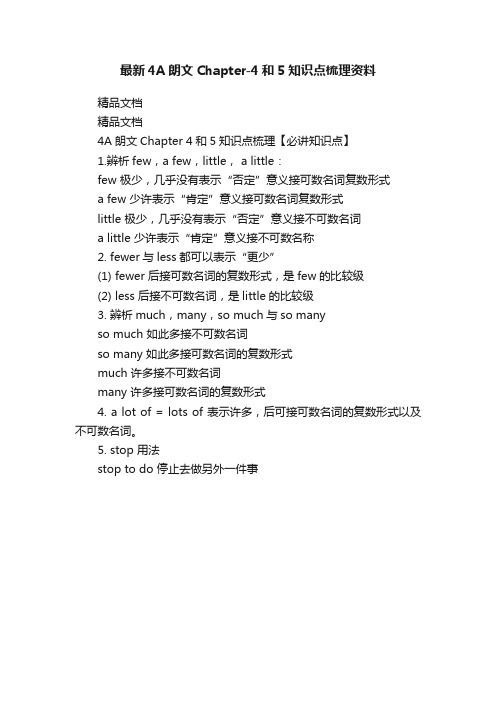
最新4A朗文Chapter-4和5知识点梳理资料
精品文档
精品文档
4A朗文Chapter 4和5知识点梳理【必讲知识点】
1.辨析few,a few,little, a little:
few 极少,几乎没有表示“否定”意义接可数名词复数形式
a few 少许表示“肯定”意义接可数名词复数形式
little 极少,几乎没有表示“否定”意义接不可数名词
a little 少许表示“肯定”意义接不可数名称
2. fewer与less都可以表示“更少”
(1) fewer 后接可数名词的复数形式,是few的比较级
(2) less 后接不可数名词,是little的比较级
3. 辨析much,many,so much与so many
so much 如此多接不可数名词
so many 如此多接可数名词的复数形式
much 许多接不可数名词
many 许多接可数名词的复数形式
4. a lot of = lots of 表示许多,后可接可数名词的复数形式以及不可数名词。
5. stop 用法
stop to do 停止去做另外一件事。
香港朗文WTE 4A第三单元 词汇语法 知识点
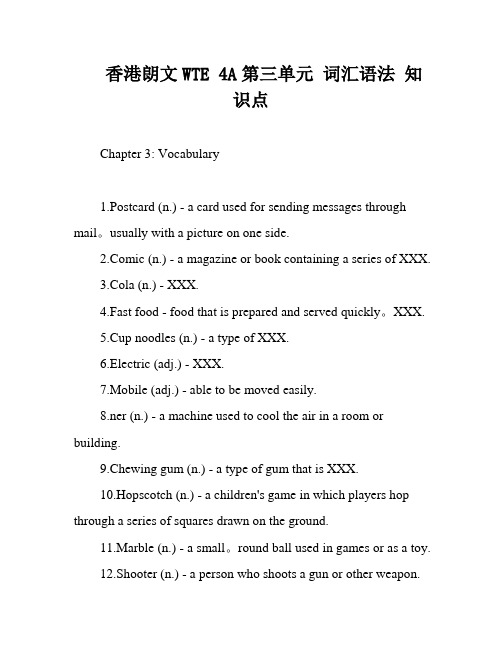
香港朗文WTE 4A第三单元词汇语法知识点Chapter 3: Vocabulary1.Postcard (n.) - a card used for sending messages through mail。
usually with a picture on one side.ic (n.) - a magazine or book containing a series of XXX.3.Cola (n.) - XXX.4.Fast food - food that is prepared and served quickly。
XXX.5.Cup noodles (n.) - a type of XXX.6.Electric (adj.) - XXX.7.Mobile (adj.) - able to be moved easily.8.ner (n.) - a machine used to cool the air in a room or building.9.Chewing gum (n.) - a type of gum that is XXX.10.Hopscotch (n.) - a children's game in which players hop through a series of squares drawn on the ground.11.Marble (n.) - a small。
round ball used in games or as a toy.12.Shooter (n.) - a person who shoots a gun or other weapon.13.Flick (v.) - to make a sudden。
XXX.14.Lose (v.) - to not win a game or XXX.15.Quiz (n.) - a short test or XXX.16.Trainer (n.) - a type of shoe designed for sports or exercise.17.Credit card (n.) - a plastic card used to make purchases on credit.18.(n.) - a device used for XXX.19.Rickshaw (n.) - a type of XXX.20.Oil lamp (n.) - a lamp that burns oil for light.21.Clog (n.) - a type of shoe with a thick wooden sole.22.Iron (n.) - a device used for XXX.23.Congee (n.) - a type of XXX.24.n (n.) - a public display of art。
完整)香港朗文4a各单元总结,推荐文档

完整)香港朗文4a各单元总结,推荐文档Unit One Summary:In Unit One。
we XXX。
Some of the key verbs we learned were read。
roller-skate。
play。
draw。
paint。
jog。
listen。
go。
dance。
swim。
and walk。
We also learned how to talk about our likes and dislikes using the sentence pattern "What do you like doing?" and "I like。
" or "I don't like。
"。
nally。
XXX such as "like doing in your spare time," "play table tennis," "play on the swings," "I'm busy," "walk away," and "go ice-skating"。
Finally。
we learned the past tense of some common verbs such as are。
say。
get。
leave。
go。
and think.Unit Two Summary:In Unit Two。
we focused on XXXXXX pattern "Do you ever。
" and "Yes。
I usually。
" or "No。
I never。
"。
nally。
XXX such as "look after your pets," "tidy your room," "get up late," "go tobed early," and "eat out"。
最新香港朗文4A各单元知识要点 词汇语法
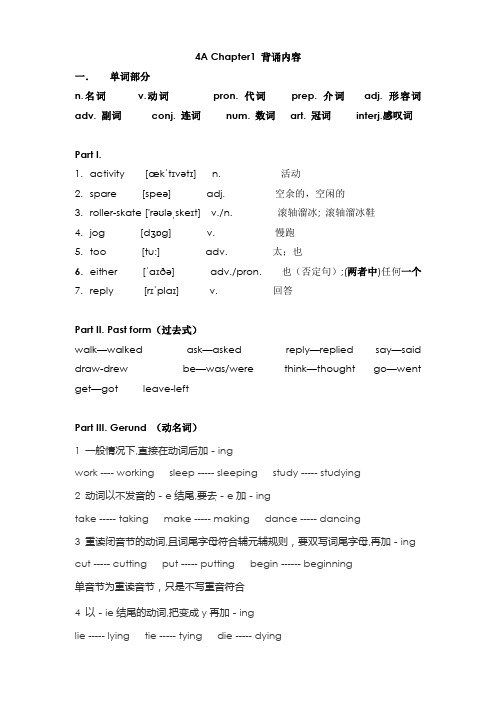
4A Chapter1 背诵内容一.单词部分n.名词v.动词pron. 代词prep. 介词adj. 形容词adv. 副词conj. 连词num. 数词art. 冠词interj.感叹词Part I.1.activity [ækˈtɪvətɪ] n. 活动2.spare [speə] adj. 空余的,空闲的3.roller-skate ['rəʊləˌskeɪt] v./n. 滚轴溜冰; 滚轴溜冰鞋4.jog [dʒɒg] v. 慢跑5.too [tu:] adv. 太;也6.either [ˈaɪðə] adv./pron. 也(否定句);(两者中)任何一个7.reply [rɪˈplaɪ] v. 回答Part II. Past form(过去式)walk—walked ask—asked reply—replied say—said draw-drew be—was/were think—thought go—went get—got leave-leftPart III. Gerund (动名词)1 一般情况下,直接在动词后加-ingwork ---- working sleep ----- sleeping study ----- studying2 动词以不发音的-e结尾,要去-e加-ingtake ----- taking make ----- making dance ----- dancing3 重读闭音节的动词,且词尾字母符合辅元辅规则,要双写词尾字母,再加-ing cut ----- cutting put ----- putting begin ------ beginning单音节为重读音节,只是不写重音符合4 以-ie结尾的动词,把变成y再加-inglie ----- lying tie ----- tying die ----- dying二.词组部分1.i n one’s spare time在某人的空余时间2.listen to (the) music 听音乐3.play chess 下棋4.like/love/enjoy doing 喜欢干某事5.go swimming (去)游泳6.go jogging (去)慢跑7.go roller-skating (去)溜冰8.be good at sth./doing 擅长于某事/干某事9.be poor at sth./doing 不擅长于某事/干某事10.be interested in sth./doing 对干某事/干某事感兴趣11.be afraid of sth./doing 害怕某事/干某事12.at/on the weekend 在周末at/on weekends13.on weekdays 在工作日14.be busy with sth. 忙于某事15.be busy doing 忙于干某事16.enjoy oneself= have a good time 某人玩得很开心17.a family helper 一位家庭帮手18.pick up kids 接小孩19.play the piano/violin 弹钢琴,拉小提琴(西洋乐器名词前加the )20.play Erhu 拉二胡(民族乐器前无the)21.play table tennis 打羽毛球(球类名词前无the)22.play on the swing/slide 在秋千(滑滑梯)上玩23.play with sb. 与某人一起玩24.play with sth. 玩耍某物25.a bit later 一会儿以后26.walk away sadly 难过地走开了27.walk the dog 溜狗28.walk home=go home on foot 走回家29.go home =go back home 回家30.after that 在那以后31.the black notes (钢琴上)黑键32.see sb. doing 看到某人在干某事33.make a new friend named Tom 交了一个叫汤姆的朋友34.in fact = actually/ˈæktʃʊəlɪ/事实上35.in the gym 在体育馆36.indoor stadium /'steɪdɪəm/ 室内体育馆37.finish sth./doing sth. 完成某事/干某事38.be important to sb. 对某人而言是重要的(绿色字体部分为拓展内容,供学有余力的小朋友默写。
- 1、下载文档前请自行甄别文档内容的完整性,平台不提供额外的编辑、内容补充、找答案等附加服务。
- 2、"仅部分预览"的文档,不可在线预览部分如存在完整性等问题,可反馈申请退款(可完整预览的文档不适用该条件!)。
- 3、如文档侵犯您的权益,请联系客服反馈,我们会尽快为您处理(人工客服工作时间:9:00-18:30)。
4a各单元总结Unit One
1.
2.重点句型:
(1) –What do you like doing?
-- I like swimming, reading and listening to music
(2) I like reading too.
(3) I don’t like playing table tennis either.
(4) Let’s go ice-skating.
3.
4.
Unit two
1.
2.重点句型:
(1)--Do you ever tidy your room?
-- Yes, I usually tidy my room.
(2)—Does she ever play the violin?
-- No, she never plays the violin.
-- No, she doesn’t play the violin.
3.
4.
Unit Three 1.
2.
3.
(1)--Was there any cola when you were young?
-Yes, there was.
(2)The game I like best was marbles.
(3)How do you play marbles?
(4)– Did you wear trainers fifty years ago?
--Yes, I did.
(5)—Did you have a telephone?
-- No, I didn’t. Rich people had telephones at home but poor people didn’t.
(6 ) – Did you shop at the supermarket?
--- No, I didn’t. There weren’t any supermarkets.
(7) – Did you go to school?
-- No, I didn’t. Rich children go to school but poor children didn’t.
(8) –Did you listen to the radio?
-- Yes, I did.
Where(哪里)do you like going to in your holiday?
How(如何)do you help at home?
How much (多少钱,提问不可数名词)is it? --- It is five dollars. How many (多少,提问可数名词)books in your home?
What time(什么时间)is it?
What(什么)are you doing now? ----I am doing my homework. What(什么)is the weather like today? ----It’s windy.
What color (什么颜色)is it? ---- It is red.
What (什么)are you? ( What do you do?) -----I am a driver.
When(什么时候)is your birthday? ---on 2nd May
How old(多大)are you? ----I am ten.
Who (谁) are you? -----I am David.
Which(哪一个) club do you want to join?
Why(为什么)do you like playing football?----Because I like being healthy.。
